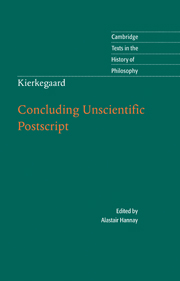Book contents
- Frontmatter
- Contents
- Introduction
- Chronology
- Further reading
- Note on the translation
- CONCLUDING UNSCIENTIFIC POSTSCRIPT TO THE PHILOSOPHICAL CRUMBS
- Preface
- Contents
- Introduction
- Part One The objective problem of Christianity's truth
- Part Two The subjective problem. The subject's relation to the truth of Christianity, or what it is to become a Christian
- 1 An expression of gratitude to Lessing
- 2 Possible and actual theses of Lessing
- 1 Becoming subjective
- 2 The subjective truth, inwardness; truth is subjectivity
- 3 Actual, ethical subjectivity; the subjective thinker
- 4 The problem of the Crumbs: how can an eternal happiness be built on historical knowledge?
- 5 Conclusion
- Appendix: Understanding with the reader
- A first and last declaration by S. Kierkegaard
- Index
- Cambridge Texts in the History of Philosophy
1 - Becoming subjective
Published online by Cambridge University Press: 26 February 2010
- Frontmatter
- Contents
- Introduction
- Chronology
- Further reading
- Note on the translation
- CONCLUDING UNSCIENTIFIC POSTSCRIPT TO THE PHILOSOPHICAL CRUMBS
- Preface
- Contents
- Introduction
- Part One The objective problem of Christianity's truth
- Part Two The subjective problem. The subject's relation to the truth of Christianity, or what it is to become a Christian
- 1 An expression of gratitude to Lessing
- 2 Possible and actual theses of Lessing
- 1 Becoming subjective
- 2 The subjective truth, inwardness; truth is subjectivity
- 3 Actual, ethical subjectivity; the subjective thinker
- 4 The problem of the Crumbs: how can an eternal happiness be built on historical knowledge?
- 5 Conclusion
- Appendix: Understanding with the reader
- A first and last declaration by S. Kierkegaard
- Index
- Cambridge Texts in the History of Philosophy
Summary
What would there be for ethics to judge if becoming subjective were not the highest task set for a human being; what must be put aside on a closer understanding of this; examples of thinking directed towards becoming subjective.
Objectively, one always speaks only to the matter at issue; subjectively one speaks of the subject and subjectivity – and then, what do you know, subjectivity is the matter at issue! It has constantly to be stressed that the subjective problem is nothing about the matter at issue, it is the subjectivity itself. For since the problem is the decision and all decision lies, as was shown above, in subjectivity, the important thing is that objectively there be absolutely no remaining trace of a matter at issue, for at that very moment subjectivity wants to sneak its way out of some of the pain and crisis of decision, i.e., make the problem a little objective. If the introductory science is waiting for one more work to appear before taking the matter up for judgment; if the system still lacks a paragraph; if the speaker has still another argument up his sleeve, the decision is postponed. Hence, what is raised here is not the question of the truth of Christianity, in the sense that if this was decided, subjectivity would be ready and willing to accept it. No, it is a question of the subject's acceptance.
- Type
- Chapter
- Information
- Kierkegaard: Concluding Unscientific Postscript , pp. 107 - 158Publisher: Cambridge University PressPrint publication year: 2009

